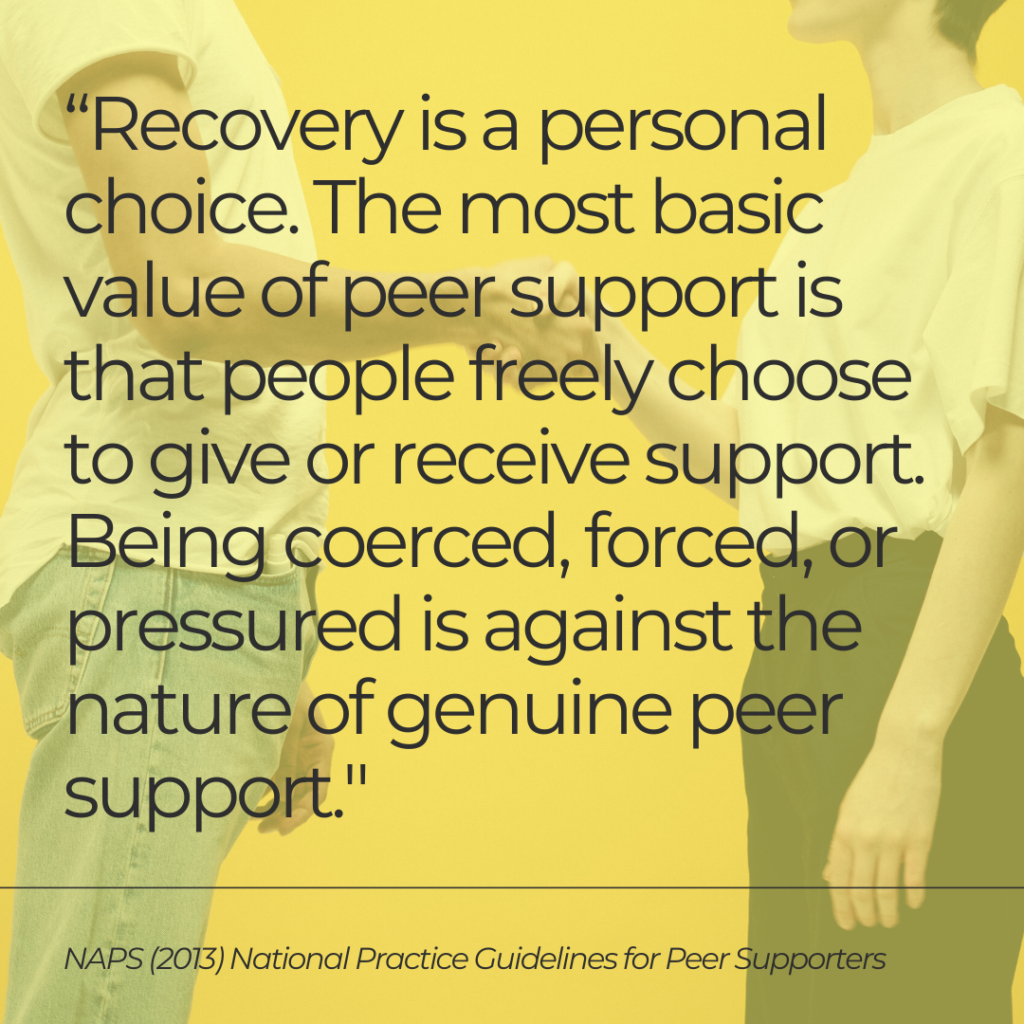Peer Support is an extremely effective and evidence-based mental health service that uses a person’s lived experience to help others in their recovery. This blog is part of our new yearlong series, where each month we will take a deeper look at what it means to work as a Peer Support Specialist and how to adhere to the 12 ethical guidelines created by the National Association of Peer Supporters (NAPS).
For this blog, we will be focusing on the guideline that states peer support is voluntary.

Why is this guideline important?
For many people in recovery, the nature of what they are struggling with has often been involuntary – traumatic experiences or the impacts of having a mental health or substance use condition are often forced upon people without their consent. To make matters worse, those who need support can sometimes be pressured into services they aren’t ready for or don’t want by people like family members or court systems. This can be an uncomfortable and often distressing experience.
Research tells us that those who are coerced into doing things often don’t get the full personal value of the actions they take. On the topic of self-motivation, an article posted on PositivePsychology.com states:
“Doing things because we feel we have to do them or to gain some external reward is enough in many cases, but it doesn’t invoke the passion needed to drive innovation and excellence. It’s fine to use external sources to motivate you in some areas, but external motivation is less likely to leave you feeling personally fulfilled and finding deeper meaning in your life.” – Self-Motivation Explained (2019)
Personal fulfillment, passion, and deep personal meaning are all feelings that can be vital to the recovery process. By allowing the support to remain voluntary, it ensures that Peer Support Specialists can maintain the relationship and values that are essential to the success of their services.
What does this guideline look like in practice?
Because peer support has proven its success, organizations may be tempted to make it a mandatory service. Community mental health services sometimes require people to engage in peer services in order to continue receiving treatment or care. Additionally, sometimes Peer Support Specialists are expected to be enforcers and coerce people to meet certain criteria before they can leave inpatient facilities or move forward in a program.
Peer Support Specialists should never serve as gatekeepers to services or resources – individuals should not have to meet with Peer Support Specialists to get in or out of a program.
“Voluntary” means freely chosen and Peer Support Specialists can find ways to encourage people to engage through outreach, listening deeply, and being trustworthy. Approaching someone with physical resources or simply greeting them at a walk-in center can be a great way to gauge people’s interest in the services available to them. If they engage, great! If not, it is important to respect their wishes. This ensures that they have a choice in their care, and they may also be more likely to return and request support if they feel like they are in control of what happens to them.
How to use this guideline moving forward
However Peer Support Specialists or organizations choose to apply this guideline, it is important to make sure that it is being applied in ways that people feel they have a clear and obvious choice in whether or not they would like to receive peer support.
To test whether the support is voluntary, start by reflecting on questions like:
“How are the services offered?”
“Is this person here on their own accord?”
“Does this person seem comfortable in our work together?”
By making an effort to keep this value present in individual or organizational services, Peer Support Specialists can be sure that they are remaining within the ethical guidelines of peer support and allowing individuals the autonomy they need to become established in their recovery.
